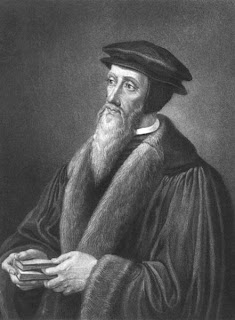When I was at the University Reformed Church's Men's Retreat on Feb. 15-17, 2013, the speaker Jason Helopoulos read this meaningful paragraph from John Calvin's Institutes. It is a powerful paragraph located in 2.16.19 of the Institutes that is worthy of reading and meditating on again and again because of it's powerful words about Christ.
“We see that our whole salvation and all its parts are comprehended in Christ (Acts 4:12). We should therefore take care not to derive the least portion of it from anywhere else. If we seek salvation we are taught by the very name of Jesus that it is ‘of him’ (1 Cor 1.13). If we seek any other gifts of the Spirit, they will be found in his anointing. If we seek strength, it lies in his dominion; if purity, in his conception; if gentleness, it appears in his birth. For by his birth he was made like us in all respects (Heb 2:17) that he might learn to feel our pain (Heb 5:2). If we seek redemption, it lies in his passion; if acquittal, in his condemnation; if remission of the curse, in his cross (Gal 3:13); if satisfaction, in his sacrifice; if purification, in his blood; if reconciliation, in his descent into hell; if mortification of the flesh, in his tomb; if newness of life, in his resurrection; if immortality, in the same; if inheritance of the Heavenly Kingdom, in his entrance into heaven; if protection, if security, if abundant supply of all blessings, in his Kingdom; if untroubled expectation of judgement, in the power given to him to judge. In short, since rich store of every kind of good abounds in him, let us drink our fill from this fountain and from no other” (Institutes 2.16.19).
John Calvin (1509-1564) was a French theologian and reformer. Calvin's Institutes of the Christian Religion are described this way on Wikipedia:
The Institutes of the Christian Religion is John Calvin's seminal work on Protestant systematic theology. Highly influential in the Western world and still widely read by theological students today, it was published in Latin in 1536 (at the same time as the English King Henry VIII's Dissolution of the Monasteries) and in his native French in 1541, with the definitive editions appearing in 1559 (Latin) and in 1560 (French) (Source).You can read the entire contents of the Institutes of the Christian Religion online at the Reformed.org Website.
To read other posts on the blog about John Calvin search for the John Calvin Label.
The photo of John Calvin is in the Public Domain as the copyright has expired.

No comments:
Post a Comment